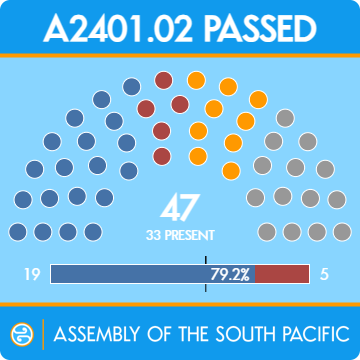Creating an official military for the purposes of regional defense, war, and gameplay.
1. General Corps Admiralty
(1) The General Corps Admiralty is a commission comprising up to three Commanders Captains and the Prime Minister, or their appointed designee. A Commander Captain on the General Corps Admiralty shall be called an General Admiral.
(2) The General Corps Admiralty shall be the supreme entity leading the military, hold responsibility for the planning and overseeing all missions of the military, decide all personnel matters including applications and promotions, and handle disciplinary actions as a tribunal.
(3) In case of a vacancy on the General Corps Admiralty, the Prime Minister may appoint a Commander Captain with approval by the Assembly to become an General Admiral. Should there be no Generals Admirals, the military shall not operate except for the self-defense of the South Pacific, for the defense of an ally, or for the purposes of explicit treaty obligations.
(4) An General Admiral is removed from the General Corps Admiralty if
- the General Admiral no longer holds the rank of Commander Captain (temporary demotions shall not be considered for this purpose),
- a simple majority of the General Corps Admiralty votes for the removal, or
- the General Admiral is recalled by the Assembly through regular order.
2. Ranks
(1) The attainable ranks in the military are, from lowest to highest:
- Trainee Cadet, which is the entry rank for any new member of the military, regardless of prior experience;
- Soldier Ensign, which is the rank for which a member of the military is considered to be able to autonomously follow any order described in battlefield-typical terms;
- Officer Lieutenant, which is for individuals deemed capable of leading troops in operations;
- Commander Captain, which is considered the rank that can plan and execute larger, potentially long-term operations.
(2) The General Corps Admiralty may introduce specialized ranks within the main ranks at its discretion.
(3) The General Corps Admiralty shall define rank requirements for each rank, which must be viewable by any member of the military. The requirements must include objective criteria based on operations performed by the individual in the name of this military, as well as subjective criteria based on the General Corps Admiralty’s judgement of the individual’s character as it relates to the specific rank to be attained.
(4) For the rank requirements for Commanders Captains, the General Corps Admiralty must include criteria that require state-of-the-art skills and knowledge required for liberating a large game-created region.
(5) When rank requirements are changed such that there are members of the military that no longer qualify for their current rank, the General Corps Admiralty must grant a reasonable grace time for affected members to meet these new requirements before they are demoted.
3. Rules
[…]
(3) A member of the military may only be a member of another military with assent of the General Corps Admiralty, which it may rescind at any time and for any reason. If the member’s other military is on the opposing side of an arbitrary R/D conflict, the member may not change sides for the duration of the operation, and shall be considered suspended from the military for the duration of the operation should they be engaged on the opposing side.
[…]
(6) A member of the military is required to perform at least one mission every calendar month, unless suspended or granted leave by the General Corps Admiralty.
(7) The General Corps Admiralty may instate additional rules that do not contradict rules stated here at its discretion. These rules must be publicly visible.
4. Disciplinary Actions
(1) The General Corps Admiralty is responsible for determining whether a member of the military has conducted themselves in a way not befitting their rank or not befitting their membership in the military. Upon making such a determination, the General Corps Admiralty will issue one or more disciplinary actions as appropriate, keeping in mind the severity of the infraction and the individual’s disciplinary history.
[…]
(3) A member of the military subject to a disciplinary action may appeal that disciplinary action and offer a defense to be reviewed by the General Corps Admiralty. If an amicable resolution cannot be achieved, the member may demand that the charge be brought to the High Court. In this case, the court shall conduct a trial akin to a criminal trial, in which General Corps Admiralty shall act as the Complainant, the accused member as the Accused, and the disciplinary actions listed herein shall be used by the court for sentencing.
